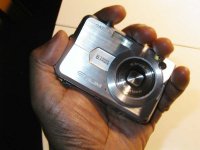petronius said:
(I can live with one woman, but not with one camera!)
Now,
that's a quote for the ages.
I suppose that, had I remained faithful to and happy with SLRs, I might have been tempted by the digital juggernaut. But I bolted to RFs and stuck with film...mostly. I inherited a 2001-era Olympus digital p/s just about a year ago. Only gets used for stuff I generally wouldn't bother loading up my film-burners for, so it's worked out...except, of course, for those instances where it was the only camera on my person when a Really Great Image emerges before my eyes, and I would curse its "mere" 2.1 megapixels.
Sooo...I did some wandering on the 'Bay, where I found something a bit more up-to-date, and, hopefully, smaller, than that blasted Olympus. I found my answer in a mostly-gently-used Casio Exilim EX-Z850, with four times the resolution (8.1MP), much-smaller form-factor (slightly smaller than a pack of unfiltered Luckys, which is amusing to this non-smoker), has an optical viewfinder (which I insist on, although I
do like this camera's bright 2.5" LCD), minimal lag time, and manual exposure control and focus options. I've only had the camera in my possession for a handful of hours, but I love how something so tiny does so many nice things so well. I've maintained for a while that to love (and generally prefer) film doesn't mean hating digital outright. In fact, I've been of the mind that the real action in the digital camera world isn't with the megabuck dSLRs of the day, but with the more humble compacts and sub-compacts of more-ambitious design. High-end digitals are huge, ponderous, and crazy-pricy. At the present state of the art, I wouldn't dream of ditching my Hexars for any of them. (Having mostly sworn off SLRs of
any persuasion, that wasn't exactly a tough decision.) But...as a companion to my kit (even my Ricoh GR1), my new Casio is damned near essential, and does about 95% of what I need a digicam to do for me. And it easily fits in a pocket. My main problem now is not falling asleep while reading the crazy-thick Owner's Manual.
🙄
- Barrett


